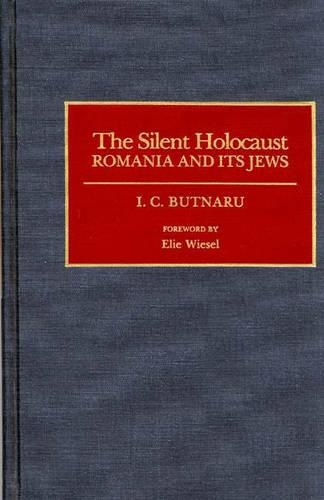
The Silent Holocaust: Romania and Its Jews
(Hardback)
Publishing Details
The Silent Holocaust: Romania and Its Jews
By (Author) Rene Spodheim
Bloomsbury Publishing PLC
Praeger Publishers Inc
22nd January 1992
United States
Classifications
Tertiary Education
Non Fiction
Second World War
Modern warfare
Social groups: religious groups and communities
The Holocaust
940.531809498
Physical Properties
Hardback
264
Description
In 1939 the Jewish population of Romania exceeded 750,000: the third largest concentration of Jews in Europe. By 1944, some 400,000 had disappeared. Another 150,000 Ukrainian Jews died at the hands of Romanian soldiers. In the quest for a "final solution" Romania proved to be Hitler's most enthusiastic ally. In "The Silent Holocaust", Butnaru, himself a survivor of the Romanian labor camps, provides a full account and demonstrates that anti-Semitism was a central force in Romania's history. He begins by examining the precarious status of Romanian Jewry in the years prior to World War I. He then reviews the period to the establishment in September, 1940, of the National Legionary State, a period when anti-Semitism became the unifying force in politics. The remainder of the book covers the Holocaust years, and reveals that Romania's premeditated mass murder of Jews was well underway before the Reich's gas chambers became operational. "The Silent Holocause" should prove invaluable for students of World War II, the Holocaust and Jewish and Eastern European studies.
Reviews
It is effective as a "cry" and it should contribute to further, much needed study of a major issue that continues to have profound and unsettling effects in the present.-Harvard Educational Review
Mr. I.C. Butnaru's books are certainly recommended for public, academic and special libraries, and could be equally useful on the shelves of Judaica or Holocaust in special, as well as of Eastern Europe history or Romanian history in particular.-EMIE Bulletin
The author, a survivor of the Holocaust, documents in detail the widespread but uncoordinated destruction of the Jews of Romania between 1940 and 1944 and argues that the process preceded the Nazi's systematic mass killings. By reviewing historical and cultural biases against Jews and legislation that embodied anti-Semitism, Butnaru shows that government action to eliminate the Jews reflected the broadly held popular belief that Jews could be blamed for all troubles. Romania's early history and development are outlined, but the the fascist legionary movement between the wars, German coalition, and leadership of Ion Antonescu during World War II are focal points. With its high detail and narrow focus, this study is for scholars of the region and larger collections.-Library Journal
The collapse of communism has opened up archives on the Holocaust that will affect the writing about it in Eastern Europe forever. The major impact of the new research will be in the details of documentation, but in the long run, the conceptualization of events that led to the Jewish tragedy may also change. Although he has collected a great deal of information about the Jews during the pre-Holocaust and Holocaust period in Romania, Butnaru, unfortunately, has not been able to take advantage of the altered conditions in the country of his birth. The purpose of the book is to present a viewpoint rather than an analysis of the events that it describes. The author states: "The book wishes only to be a cry to strip away the layers of indifference and guilty silence." On that level the author succeeds fully.-Choice
"It is effective as a "cry" and it should contribute to further, much needed study of a major issue that continues to have profound and unsettling effects in the present."-Harvard Educational Review
"Mr. I.C. Butnaru's books are certainly recommended for public, academic and special libraries, and could be equally useful on the shelves of Judaica or Holocaust in special, as well as of Eastern Europe history or Romanian history in particular."-EMIE Bulletin
"The author, a survivor of the Holocaust, documents in detail the widespread but uncoordinated destruction of the Jews of Romania between 1940 and 1944 and argues that the process preceded the Nazi's systematic mass killings. By reviewing historical and cultural biases against Jews and legislation that embodied anti-Semitism, Butnaru shows that government action to eliminate the Jews reflected the broadly held popular belief that Jews could be blamed for all troubles. Romania's early history and development are outlined, but the the fascist legionary movement between the wars, German coalition, and leadership of Ion Antonescu during World War II are focal points. With its high detail and narrow focus, this study is for scholars of the region and larger collections."-Library Journal
"The collapse of communism has opened up archives on the Holocaust that will affect the writing about it in Eastern Europe forever. The major impact of the new research will be in the details of documentation, but in the long run, the conceptualization of events that led to the Jewish tragedy may also change. Although he has collected a great deal of information about the Jews during the pre-Holocaust and Holocaust period in Romania, Butnaru, unfortunately, has not been able to take advantage of the altered conditions in the country of his birth. The purpose of the book is to present a viewpoint rather than an analysis of the events that it describes. The author states: "The book wishes only to be a cry to strip away the layers of indifference and guilty silence." On that level the author succeeds fully."-Choice
Author Bio
I. C. BUTNARU was in a Romanian labor camp during World War II and lectures on the Holocaust and the arts at Boston University. He was a member of the Society of Romanian Writers. Forbidden to write freely on political issues in Communist Romania, he immigrated to the United States in 1974. He is the author of five earlier books.
